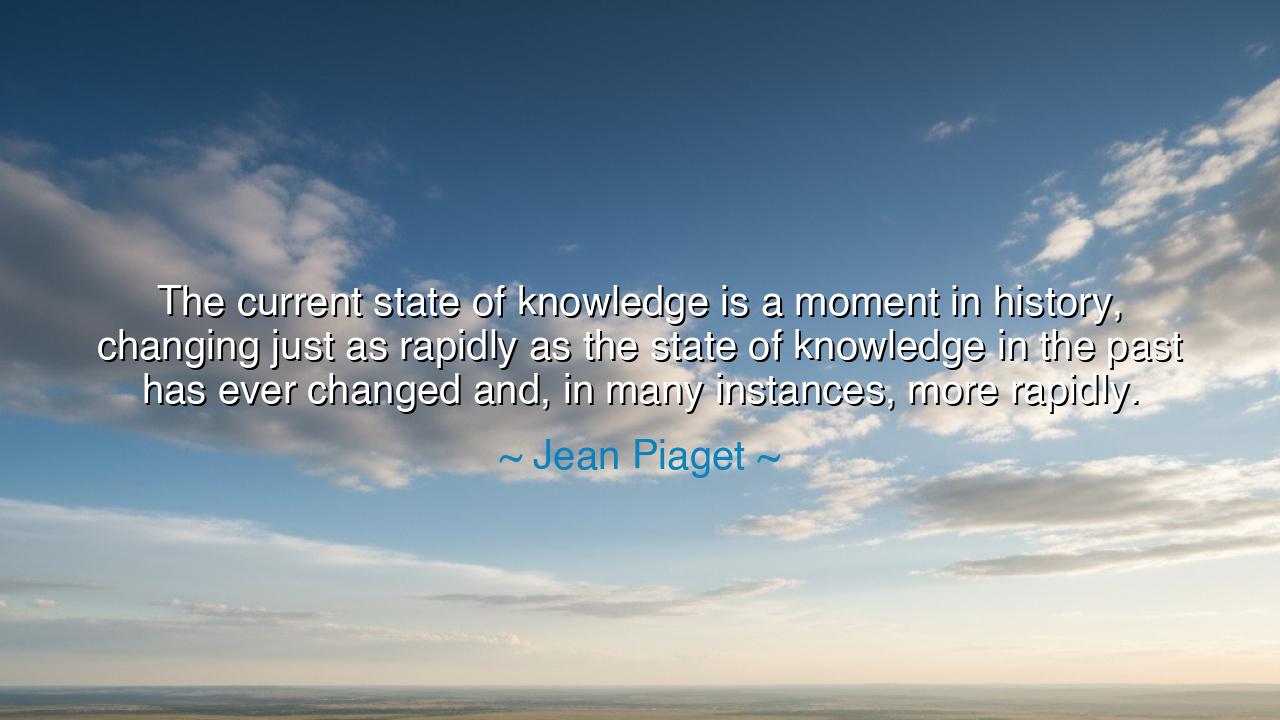
The current state of knowledge is a moment in history, changing
The current state of knowledge is a moment in history, changing just as rapidly as the state of knowledge in the past has ever changed and, in many instances, more rapidly.






Jean Piaget, the great interpreter of the mind’s growth, once spoke with the clarity of a sage: “The current state of knowledge is a moment in history, changing just as rapidly as the state of knowledge in the past has ever changed and, in many instances, more rapidly.” In this truth we hear the thunder of time, reminding us that nothing held by human reason is eternal, that all understanding is but a step along an unending road. What we know today, however firm it feels, is but a passing shape—soon to be reshaped, deepened, or even overturned by the discoveries of tomorrow.
The origin of these words lies in Piaget’s life-long study of children, where he saw knowledge not as fixed, but as ever-developing. A child, he discovered, moves from stage to stage, reshaping their understanding as new experiences dawn. What is true for the individual child is also true for humanity as a whole: civilizations grow through stages, their knowledge expanding, shifting, transforming. Thus, Piaget teaches us that we live not in the fullness of truth, but in its unfolding, and that our era, like all others, must humble itself before the relentless change of history.
History itself offers us many echoes of this wisdom. Once men believed the earth to be the center of the universe, until Copernicus and Galileo revealed otherwise. Once physicians trusted in humors and bloodletting, until Pasteur and others unveiled the unseen world of germs. Once it was thought impossible for men to fly, until the Wright brothers rose into the air. In each case, the knowledge of one age appeared secure, yet was swiftly undone by the next. Thus Piaget’s words remind us: the truths we cherish now are but milestones, not final destinations.
And in our own time, the change accelerates. The dawn of computers, the rise of artificial intelligence, the unlocking of the human genome—these advances arrive faster than any in past centuries. What took generations to shift in the past now transforms within decades, sometimes even within years. Piaget foresaw this swiftness, warning that the state of knowledge is not merely in motion but racing ahead with a speed that demands both awe and caution.
The deeper meaning is this: to cling stubbornly to the present state of knowledge as though it were final is folly. To despise it as useless is also folly. The wise understand that knowledge is a river—it nourishes us now, yet always flows on, carrying us toward new lands. We must drink deeply, but also be ready to move when its course bends. This humility, this readiness to adapt, is the mark of true wisdom.
The lesson for us is profound: hold knowledge as precious, but not as permanent. Celebrate the discoveries of your age, but do not worship them as eternal idols. Teach your children not merely to accept what is known, but to question, to explore, to reach beyond. For in their hands lies the knowledge that will one day replace ours, just as ours replaced that of those who came before. To prepare them for this task is the highest duty of any generation.
Practical action lies before us. Seek always to learn, for the state of knowledge is ever-changing, and those who cease to grow are left behind. Question with humility, remembering that even the greatest truths of today may be humbled tomorrow. Embrace change not as a threat but as the heartbeat of history. And above all, pass on the spirit of curiosity to the young, that they may carry the torch of discovery further than we can imagine.
Thus Piaget’s words shine as a timeless beacon: knowledge is never still, never final, never complete. It changes as swiftly as the tide, as ceaselessly as the stars. Let us then walk in wonder, knowing that we stand not at the end, but always in the middle of the grand story of truth’s unfolding. And let us teach our children not to fear this change, but to embrace it, for it is in the flowing of knowledge that humanity moves ever forward.






AAdministratorAdministrator
Welcome, honored guests. Please leave a comment, we will respond soon